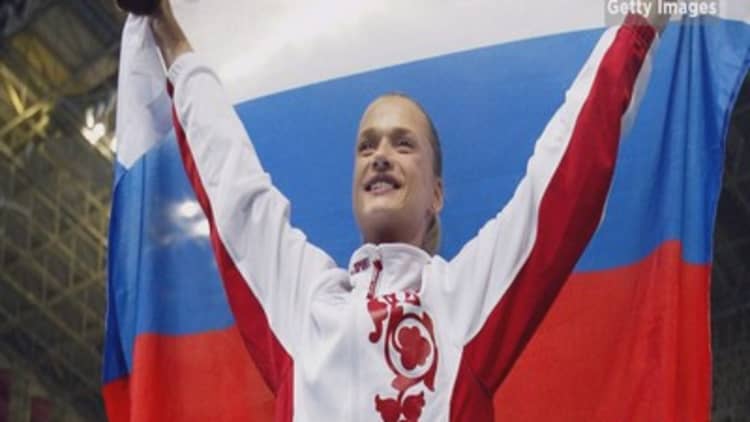
The World Anti-Doping Agency reported on Monday that Russian athletes engage in widespread use of performance-enhancing drugs — with government complicity — and suggested that the country's track and field competitors be banned from events.
The Russian news media aren't having any of it.
"The official line so far is flat-out denial, despite the abundance of proof on the contrary," said Derk Sauer, CEO of The Moscow Times, an English-language newspaper in the country. "There is the strong feeling in this particular case that doping is a worldwide problem and that Russia is the easy scapegoat."
Allegations from WADA include members of the Russian Federal Security Service intimidating lab workers, and the destruction of thousands of samples in order to "limit the extent of WADA's audit and to reduce any potential adverse findings from subsequent analysis by another WADA accredited laboratory."
The head of Russia's anti-doping laboratory, Grigory Rodchenkov, resigned on Tuesday.
Perhaps those making the accusations are living in the era of the early James Bond movies.Nikita Kamaevmanaging director, Russian Anti-Doping Agency
High-performing athletes who compete internationally are revered in Russia to a degree not seen in most of the West. Even after Russian champions retire, they often maintain a high profile in media circles, political life or both. For example, at least three Russian Olympic medalists currently serve or recently served in the State Duma, Russia's legislature: gold-medal gymnast Svetlana Khorkina, multi-gold-medal figure skater Irina Rodnina, and rhythmic gymnast Alina Kabaeva.
An analysis of the country's largely state-run media by a fluent Russian speaker with CNBC found that at first, news reports largely ignored the WADA allegations. Such was the case with "Match TV," a channel that focuses on sports news, on the evening the report came out.
Kremlin officials dismissed the findings and claimed that the report was politically motivated. The head of the Russian Anti-Doping Agency, Nikita Kamaev, proclaimed at a press conference that "perhaps those making the accusations are living in the era of the early James Bond movies."
An emerging media consensus in the country is that the WADA report is part of a concerted effort to target Russia and place the country in a negative light on the world stage.
Russia's state-run Channel 1, for example, featured reports that emphasized that there was no proof to the allegations and said that the sole goal of the investigation is to "isolate Russia."
The WADA report recommended lifetime bans for Olympic champion Mariya Savinova-Farnosova and bronze winner Ekaterina Poistogova, among others. The two women medaled in the 800 meters in London in 2012.
The International Olympic Committee (IOC) released a statement addressing WADA's commission report, saying, "This is a deeply shocking report and very saddening for the world of sport. … With regard to the Olympic Games, the IOC will continue to take whatever measures needed to safeguard clean athletes, clean sport and good governance."
Dr. Patrick Rishe, director of the Sports Business Program at Washington University in St. Louis, said he's not surprised at the findings and pointed out that doping is a problem in track and field, especially when there are loose international controls.
"While efforts to clean up the sport of track and field have increased, consistent with efforts to reduce doping in general across all sports, this story (like FIFA) shows that when you have a global sport where checks/balances may be harder to identify and control, we are more likely to see things like bribes and kickbacks, which tarnish the sport's reputation," Rishe told CNBC.




